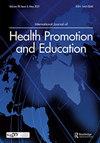The role of organisational resources for integrating health surveillance data into municipal action in Norway
IF 0.7
Q3 EDUCATION, SCIENTIFIC DISCIPLINES
International Journal of Health Promotion and Education
Pub Date : 2022-08-17
DOI:10.1080/14635240.2022.2107556
引用次数: 0
Abstract
ABSTRACT Making sure that health surveillance data are integrated into public health planning and decision-making is demanding. Politicians and their administration may lack knowledge, interest, or will to take it into account. Politics is at its core solution-driven, and this need for imminent action may outweigh the importance of solid knowledge. This paper focuses on Norwegian municipalities and fleshes out two factors that may provide an enabling environment for educating relevant personnel in health surveillance data; i) the existence of a public health coordinator and ii) the set-up of inter-sectoral working groups. We have anticipated that those organisational resources play an important role in linking the bodies of information provided in the municipalities’ health surveillance document ; the municipal health profile ; and the health promotion priorities. The findings confirm the anticipated centrality of organisational resources. Having dedicated and inter-sectoral organizational resources working as boundary spanners – such as public health coordinators – is decisive to meeting the demands of current public health challenges. Moreover, dedication is useless unless there is a critical volume of the coordinator’s work. It is only when she/he is in a full position that the profile is fully integrated. The study further identifies other conducive conditions for integration. For example, does knowledge on health determinants resides not only in statistical data, but also in qualitative experiences of people and professional practitioners. Of interest for further research is to explore how to educate such organisations to integrate such experiences into health promotion action.组织资源在将健康监测数据纳入挪威市政行动中的作用
摘要确保健康监测数据纳入公共卫生规划和决策是一项艰巨的任务。政客和他们的政府可能缺乏将其考虑在内的知识、兴趣或意愿。政治是解决方案驱动的核心,迫切需要采取行动可能超过扎实知识的重要性。本文以挪威市政当局为重点,充实了两个因素,这两个因素可能为健康监测数据方面的相关人员教育提供有利的环境;i) 公共卫生协调员的存在以及ii)部门间工作组的设立。我们预计,这些组织资源在将市政当局健康监测文件中提供的信息联系起来方面发挥着重要作用;市政卫生概况;以及促进健康的优先事项。研究结果证实了组织资源的预期中心地位。拥有专门的跨部门组织资源作为边界管理人员——如公共卫生协调员——对于满足当前公共卫生挑战的需求至关重要。此外,除非协调员的工作量达到临界水平,否则奉献精神是没有用的。只有当她/他处于一个完整的位置时,个人资料才能完全整合。该研究进一步确定了其他有利于一体化的条件。例如,关于健康决定因素的知识不仅存在于统计数据中,还存在于人们和专业从业者的定性经验中。进一步研究的兴趣在于探索如何教育这些组织将这些经验融入健康促进行动中。
本文章由计算机程序翻译,如有差异,请以英文原文为准。
求助全文
约1分钟内获得全文
求助全文
来源期刊

International Journal of Health Promotion and Education
EDUCATION, SCIENTIFIC DISCIPLINES-
CiteScore
2.30
自引率
10.00%
发文量
69
 求助内容:
求助内容: 应助结果提醒方式:
应助结果提醒方式:


